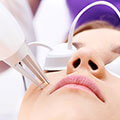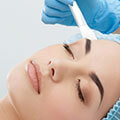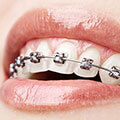
Hormone Disorders
Hormones are the chemicals produced in endocrine glands and travel around your veins with the flow of your blood and help your tissues and organs to perform their specific functions regularly. Physical growth, emotion, sexual activities, fertility, absorption & use of nutrients, metabolism and all the major functions and activities of your body is controlled by your hormones.
Hormone disorders are the consequences of your hormone imbalance when one or more hormones level go up or down. A slight change in a hormone can affect your whole body and cause you much trouble.
Here are the symptoms that can be seen when you have a hormone imbalance in your body :
• Unexpected weight gain or weight loss
• Frequent, irregular, heavy or no menstrual periods
• Infertility
• Fatigue
• Hair loss or thinning of hairs or male pattern baldness
• Unwanted hair growth (facial hair growth in women)
• Acne, scars and uneven patches
• Diarrhoea and constipation
• Abnormal heart rate
• Frequent urination
• Dry skin or puffy face
• Digestive issues
• Tenderness, stiffness and muscle pain
• Weakened muscle
• Increase thirst, sweating
• Depression, change sex drive
• Anxiety and nervousness
What Causes Hormone Disorder ?
The cause of hormone disorder depends upon which hormone or gland is affected. In this way causes of hormone disorder differ in every cases :
• Genetic or Acquired conditions like
• tumors (benign or cancerous)
• eating disorders
• medications
• stress
• cancer treatments
• injury or trauma
• Environmental factors
• Infections
• Lifestyle related...etc
• diabetes
• hypogonadism
• hypothyroidism, or underactive thyroid
• hyperthyroidism, or overactive thyroid
• thyroid nodules
• congenital adrenal hyperplasia
• Cushing syndrome
• adrenal insufficiency
• Short stature - growth hormone deficiency
• Acromegaly - excess Growth hormone
• Tumours in various glandsPCOD
• PCOD
Diagnosis of Hormone Disorder :
Before going for tests to diagnose hormone disorder your doctor will examine you by asking certain questions such as; your medical history, your family history with the disease, symptoms you have developed and something gets you some relief. After the physical examination and question session your doctor may prescribe you these tests :
• Blood Test :As most hormones can be detected in your blood. Considering this fact a blood test can determine hormone imbalance in your body.
• Other tests and imaging techniques that are used to determine different hormone disorders and tissues disorders, include; ultrasound (ovaries,uterus, thyroid, testicles ), CT scan abdomen for adrenals, CtT scan chest and abdomen for other hormone disorders, MRI scan for pituitary gland imaging, X-ray, Biopsy, Radio isotope scans for Thyroid, semen analysis etc..
Treatment Of Hormone Disorder :
Your treatment depends upon the type of hormone disorder, its cause, your physical condition, age and severity. Treatment options for hormone disorder include :
Medication: Some medications are used to supplement for hormone deficiency and some to reduce symptoms of excess hormone action. like hair loss, irregular menstrual periods, acne, aches, weight gain or weight loss, depression, anxiety, nervousness etc. These can be oral drugs , injections or local applying agents:
• Vaginal estrogen cream
• Levothyroxine tablets
• Antithyroid tablets
• Radioiodine treatment
• Anti-androgen tablets
• Metformin
• Anti diabetic tablets , injections
• Insulin
• Hormonal birth control pills
• Eflornithine (Vaniqa) cream
• Calcium supplements
Therapeutic treatments: Therapies that are used to restore hormone balance are :
• Estrogen therapy
• Testosterone therapy
• Thyroid hormone therapy
• Growth hormone therapy
Surgical treatment may be needed for certain disorders where in tumors or nodules have formed..
Subscribe to our
Newsletter
***We Promise, no spam!



